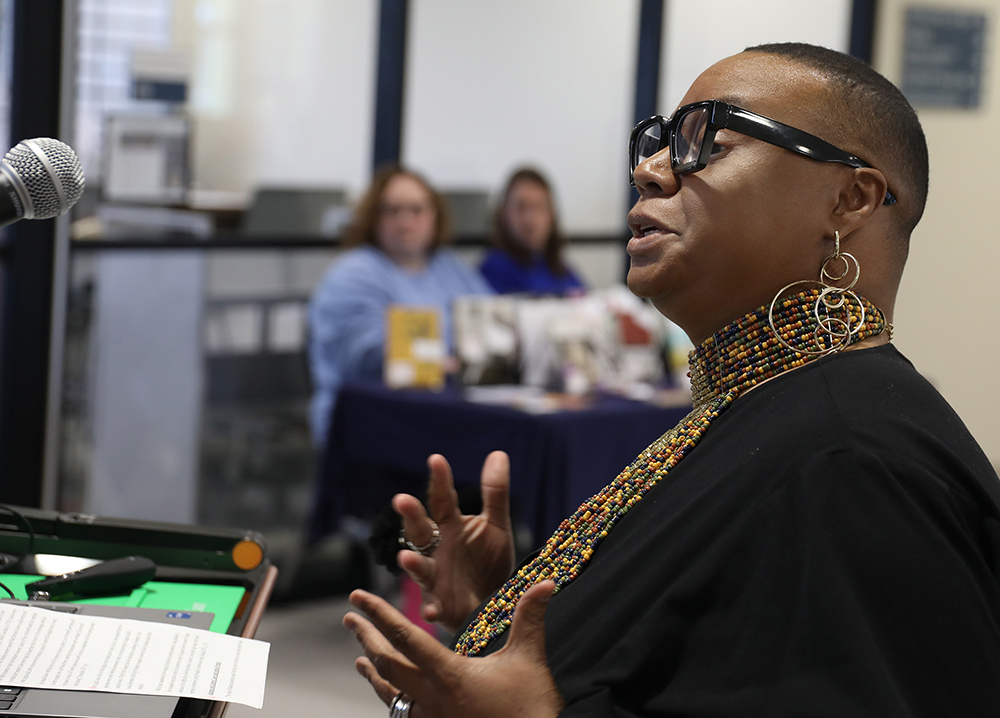
SKYCTC hosts 9th annual African American Read-In

Southcentral Kentucky Community and Technical College Professor Connie Waggoner-Edwards shares her experience growing up as an African American at the African American Read-in
By MICHAEL J. COLLINS michael.collins@bgdailynews.com
A literate community is a powerful one. It is a fact Black advocates and trailblazers have known for centuries.
On Wednesday, professors from Southcentral Kentucky Community & Technical College sought to highlight the power of Black literacy and art at the ninth annual “African American Read-In” at Bowling Green’s SKyCTC campus.
Instructor of English and integrated reading Amanda Krimmer, who helped organize the event, said events like this began as a National Council of Teachers of English initiative in 1990, aimed at encouraging the study of Black art, literature and culture.
“They’ve started all these different events across the country – community events, school events, church events – to get people more involved with Black artists, Black authors, people of influence, local community heroes, to encourage them to engage with literacy, to engage with Black artists, to learn more through that experience,” Krimmer said.
Professor Coni Waggoner-Edwards, adult education specialist Timothy Stockton and instructor Melissa Courtnage each took to the podium to share presentations on Black artists, followed by an open-forum for questions and students to share original works.
Waggoner-Edwards spoke of historical efforts to keep enslaved Black people from literacy, pointing to anti-literacy laws in the pre-Civil War and Antebellum South in states such as South Carolina, North Carolina, Georgia, Louisiana, Mississippi, Virginia and Alabama.
“Due to fear following the Stone Rebellion, the largest slave uprising in South Carolina in 1739, Blacks were prohibited from learning to read,” Waggoner-Edwards said. “Plantation owners feared that literate slaves could write and use forged documents to gain their freedom. However, many of these slaves used this method to obtain their freedom.”
She said the sacrifices and drive of her ancestors, from those who were still enslaved to her own mother, have served as an inspiration for her throughout her life.
However, it took time for her to understand her identity as a Black woman, which she struggled with throughout her youth, she said. Waggoner-Edwards finished with a poem reading of “The Black Prayer” by Wykeshia McCallister, which she said helped instill in her pride for her culture and identity.
The poem is framed as a conversation between a Black narrator and God, wherein they ask, “Why did you make me Black?” The poem ends with God’s response, saying “I didn’t make you in the image of darkness: I made you in image of me.”
Courtnage, who teaches history and humanities, then shared a “micro-lecture” on the legacy of Louis Armstrong and Cab Calloway. Courtnage is also a jazz musician who “fell in love” with Armstrong’s work at the age of 12.
Courtnage said the impact of Calloway and Armstrong extends far beyond music.
“Music is really special. Music can change entire cultures. It can be the voice of revolution. It can pick us up when we’re down. It can be celebratory, and more importantly, as a historian, it is a mirror to culture,” Courtnage said. “Louis Armstrong and Cab Calloway changed how we talk today.”
She added that early jazz musicians like Armstrong were able to push back on many segregationist barriers due to their cultural prominence, often playing at white-only establishments. His work created lasting artistic impacts on blues, rock and country music in the decades to come, Courtnage said.
Calloway, too, had a lasting impact. Courtnage presented sections of Calloway’s 1939 book, “The New Cab Calloway’s Cat-ologue: A Hepster’s Dictionary,” wherein he lays out many of the common slang terms used in Harlem for a wider, whiter audience.
It featured many phrases still used today, like “blow the top,” “chops,” “corny,” “groovy,” “G-men” and more. She added his influence on fashion helped proliferate the “Zoot suit” common at the time, and the roots of the term “Hip Hop” can even be traced back to Calloway’s slang.
Stockton, an adult education specialist at SKyCTC, then discussed his personal experience with the value of literacy.
“Now you probably haven’t noticed this, but I’m African American,” Stockton joked. “I am in favor of everything and anything that is going to promote reading and literacy in the African American community, but I also believe reading or literacy should be promoted in every race, every active group, and it’s vital for every community.”
He said the students he sees, many learning English as a second language, often overcome major barriers in their education, including educational gaps, navigating work schedules and language barriers.
“But through all of that, they are striving and working hard to do better, to make better decisions,” Stockton said. “They are striving and working hard not only to make life better for themselves, but to make life better for their families. They are working hard to do their best to make their life better.”
Stockton encouraged parents to instill in their children a love of reading, and told those without children to find someone to inspire, be they a niece or nephew, a cousin, a neighbor or a stranger.
“A community that reads is a community that is informed and equipped to do what is needed to do. A literate society is a stronger one,” Stockton said. ”I want to encourage African Americans to continue to spread the word that there is strength and power in reading.
“It improves the quality of life, and you know what else? It’s just plain fun.”
